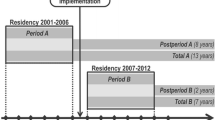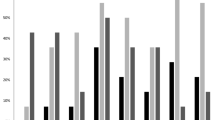Abstract
Aim
To determine (1) frequency of resident research projects being in the same orthopaedic subspecialty that they ultimately choose for fellowship and practice; (2) percentage of research projects that were published.
Methods
Resident Thesis Day programs were independently assessed by two reviewers from 2010 to 2020. Reviewers classified projects based on orthopaedic subspecialty: Spine, Joints, Trauma, Hand, Foot and Ankle, Sports, Pediatrics, Oncology, and Shoulder Elbow. Presenting residents’ fellowship subspecialty, current practice specialty, and geographic state of current practice were collected using internet searches. Correlation of residents who completed a thesis day project in the same subspecialty as their fellowship and current practice was calculated.
Results
A total of 81 resident physicians, 11 (13.6%) female, were included. In the entire cohort, 50.6% did a thesis day project in a different field than their current or projected subspecialty. Of those who completed, or are currently completing fellowship, 33 (52.4%) did their thesis day project in the same subspecialty as their fellowship. Of the current residents who have matched into fellowship, 46.7% did a thesis day project in the same subspecialty. A total of 51 (63.0%) projects were published.
Conclusion
The majority of resident research projects were published, and about 50% of orthopaedic residents went on to complete a fellowship and practice in the same subspecialty as their research project. As residents often spend a considerable amount of time and effort on their projects, these findings may help tailor resident education and research curriculums to focus more on research principles than specific orthopedic content.

Similar content being viewed by others

References
Salsberg ES, Grover A, Simon MA et al (2008) An AOA critical issue. Future physician workforce requirements: implications for orthopaedic surgery education. J Bone Joint Surg Am 90(5):1143–59
Gaskill T, Cook C, Nunley J et al (2009) The financial impact of orthopaedic fellowship training. J Bone Joint Surg Am 91(7):1814–1821
Horst PK, Choo K, Bharucha N et al (2015) Graduates of orthopaedic residency training are increasingly subspecialized: a review of the American Board of Orthopaedic Surgery Part II database. J Bone Joint Surg Am 97(10):869–875
Kavolus JJ, Matson AP, Byrd WA et al (2017) Factors influencing orthopedic surgery residents’ choice of subspecialty fellowship. Orthopedics 40(5):e820–e824
Li X, Pagani N, Curry EJ et al (2019) Factors influencing resident satisfaction and fellowship selection in orthopaedic training programs: an American Orthopaedic Association North American Traveling Fellowship Project. J Bone Joint Surg Am 101(10):e46
Resident/fellow scholarly activity specialty-specific references for DIOs: resident/fellow scholarly activity ACGME Effective as of. 2019
Osborn PM, Ames SE, Turner NS et al (2018) An analysis of research quality and productivity at six academic orthopaedic residencies. J Surg Educ 75(6):1635–1642
Bechtold JE, Williams BR, Weinstein SL et al (2017) The pursuit of scholarship: why we should care about resident research. J Bone Joint Surg Am 99(22):e119
Torres D, Gugala Z, Lindsey RW (2015) A dedicated research program increases the quantity and quality of orthopaedic resident publications. Clin Orthop Relat Res 473(4):1515–1521
Williams BR, Agel JA, Van Heest AE (2017) Protected time for research during orthopaedic residency correlates with an increased number of resident publications. J Bone Joint Surg Am 99(13):e73
Namdari S, Jani S, Baldwin K et al (2013) What is the relationship between number of publications during orthopaedic residency and selection of an academic career? J Bone Joint Surg Am 95(7):e45
Conroy MB, Shaffiey S, Jones S et al (2018) Scholarly research projects benefit medical students’ research productivity and residency choice: outcomes from the University of Pittsburgh School of Medicine. Acad Med 93(11):1727–1731
Toledo P, McLean S, Duce L et al (2016) Evaluation of the foundation for anesthesia education and research medical student anesthesia research fellowship program participants’ scholarly activity and career choices. Anesthesiology 124(5):1168–1173
Sackett DL, Rosenberg WM, Gray JA, et al. (1996) Evidence based medicine: what it is and what it isn’t. Vol. 312, BMJ (Clinical research ed.). pp. 71–2
DeVries JG, Berlet GC (2010) Understanding levels of evidence for scientific communication. Foot Ankle Spec 3(4):205–209
Author information
Authors and Affiliations
Contributions
(I) Conception and design: Joshua Piche, MD; Mark Hake, MD; Michelle Caird, MD; Ilyas Aleem, MD. (II) Administrative support: Mark Hake, MD; Michelle Caird, MD; Ilyas Aleem, MD; Ilyas Aleem, MD. (III) Provision of study materials or patients: Joshua Piche, MD; Carter Selzer; Ilyas Aleem, MD. (IV) Collection and assembly of data: Joshua Piche, MD; Carter Selzer. (V) Data analysis and interpretation: all authors. (VI) Manuscript writing: all authors. (VII) Final approval of manuscript: all authors.
Corresponding author
Ethics declarations
Ethical statement
The authors are accountable for all aspects of the work in ensuring that questions related to the accuracy or integrity of any part of the work are appropriately investigated and resolved.
Conflict of interest
The authors declare no competing interests.
Additional information
Publisher's note
Springer Nature remains neutral with regard to jurisdictional claims in published maps and institutional affiliations.
Rights and permissions
About this article
Cite this article
David Piche, J., Selzer, C.J., Hake, M.E. et al. Are resident research projects correlated to future subspecialty choice in orthopaedic surgery? A ten-year retrospective review of a single centre’s experience. International Orthopaedics (SICOT) 46, 1459–1463 (2022). https://doi.org/10.1007/s00264-022-05417-x
Received:
Accepted:
Published:
Issue Date:
DOI: https://doi.org/10.1007/s00264-022-05417-x



